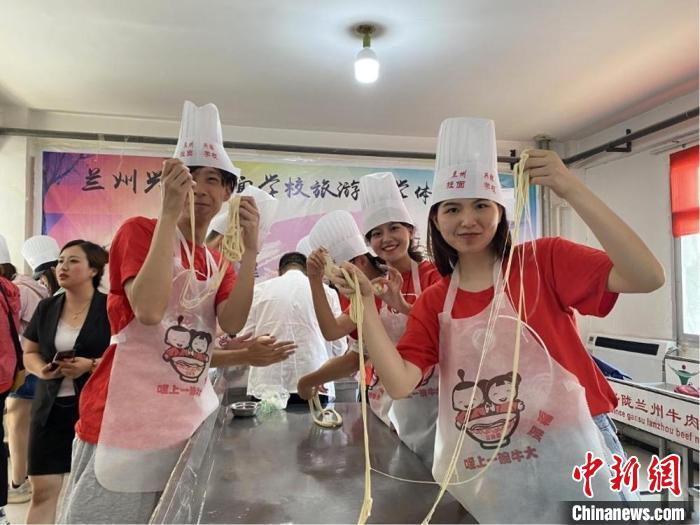
On August 5, the 20-day "Silk Road Study Camp for Cultural Heritage Friendship Messengers" was being held in Gansu. The picture shows Hong Kong and Macao teenagers learning to make beef noodles. Photo by Jiang Yu
Zhongxin Network Lanzhou, August 5 (Wen Hao Jiang Yu) "Making Lanzhou beef noodles is really not simple! After experiencing the lanzhou beef noodle making process, Ye Baochen from Hong Kong sighed, and the noodles should be added three times, kneaded nine times, and the ramen noodles also pay attention to pushing, pulling, pulling, stacking, dragging, etc. Perhaps because of this exquisiteness, Lanzhou beef noodles are famous all over the world and have become a national intangible cultural heritage.
A number of teenagers from colleges and universities across the taiwan strait walked into the Lanzhou Beef Noodle Research and Study Base to experience the noodle making process and taste authentic beef noodles. Photo by Jiang Yu
On the 5th, the 20-day "Silk Road Study Camp for Cultural Heritage Friendship Messengers" composed of 124 young people from colleges and universities across the taiwan strait and four places was being carried out in Gansu. The students walked into the Lanzhou Beef Noodle Research and Study Base to learn about the historical story of Lanzhou beef noodles, visit the antique kitchen utensils with ingredients, experience the noodle making process, taste authentic beef noodles, and exchange traditional food culture through a bowl of beef noodles.
"Lanzhou beef noodles, which originated during the Jiaqing period of the Qing Dynasty, are famous for their unique flavors of soup clear mirrors, rotten meat aromas, thin noodles and one clear, two white, three red, four green and five yellow production characteristics." The docent of the Lanzhou Beef Noodle Research and Study Base introduced to the members of the study camp that after several stages of development, Lanzhou beef noodles are not only an indispensable flavor snack for Lanzhou people, but also one of the outstanding representatives of Traditional Chinese Food Culture and China's Intangible Cultural Heritage.
The picture shows the beef noodle technician of the Lanzhou Beef Noodle Research and Research Base teaching students the skills of ramen. Photo by Jiang Yu
During this period, the members of the camp put on the chef's hat and learned to make noodles under the guidance of the beef noodle technician. After a series of operations such as washi noodles, noodles, slips, and ramen noodles, the students put their own bowl of Lanzhou beef noodles under the pot.
"I learned a lot today. A bowl of noodles is not only a noodle that can be eaten into the mouth, but also a skill that has been passed down for more than 100 years, and eventually condensed into a local folk culture. Ye Baochen said that he hopes to introduce the most authentic Lanzhou beef noodles to his classmates and friends in Hong Kong.
Yu Zhiyi, a university student from the Macao Institute for Tourism Studies, and members of the group started with beef noodles to share traditional pasta from all over the country. From the knife-cut noodles in Shanxi to the "shrimp noodles" often eaten in Hong Kong, and the "bamboo noodles" loved by Macao people... From the origin of pasta, from noodle making skills to childhood memories, hometown time-honored brands, noodle brands "rejuvenation" and other topics, the students exchanged in-depth Chinese traditional food culture.
Yu Zhiyi said, "The process of lanzhou beef noodle making experience makes us not only pay attention to whether the noodles are delicious, but also recognize the history and culture behind the noodle making as an intangible cultural heritage project. She hopes that there will be more similar study courses to bring young people closer to intangible cultural heritage.
The "Silk Road Study Camp for Cultural Heritage Friendship Messengers" is supported by the Ministry of Education's Hong Kong, Macao and Mainland Universities and Colleges and Universities Teachers and Students Exchange Program, and co-organized by the Hong Kong, Macao and Taiwan Office of Lanzhou University, the School of History and Culture of Lanzhou University and the Cultural Walker Study and Study Program, aiming to support young students from both sides of the Taiwan Strait and Hong Kong and Macao to walk along the Silk Road, visit important cultural heritage sites, experience characteristic ethnic customs, and jointly promote the inheritance of Chinese culture.
"The Intangible Cultural Heritage Experiential Learning Course is the focus of this year's study activities." According to chen jing, the project leader, in addition to the Lanzhou beef noodle making experience course, the workshop also opened research activities for young people in Hong Kong, Macao and mainland China, such as Tibetan medicine learning and specimen identification, Yugur traditional game project competition, and Min county angelica planting research. "It is hoped that through the Northwest Intangible Cultural Heritage Experiential Learning Course, young people from Hong Kong, Macao and the Mainland will have more observation and understanding of the Silk Road and the Great Northwest." (End)
Source: China News Network